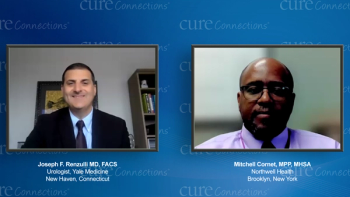
Panelists discuss the key takeaways from their experiences in treating advanced prostate cancer, emphasizing valuable lessons learned throughout the treatment journey that can guide future patient care and support.

Panelists discuss the key takeaways from their experiences in treating advanced prostate cancer, emphasizing valuable lessons learned throughout the treatment journey that can guide future patient care and support.

Panelists discuss key advice for patients and caregivers navigating advanced prostate cancer, highlighting essential insights for those newly diagnosed and sharing valuable guidance received from health care professionals and advocates during their journeys.

Panelists discuss how implementing targeted strategies can promote equity in treatment for all patients, while offering practical advice for those facing barriers to accessing necessary care for advanced prostate cancer.

Panelists discuss how personal experiences with access- to- care challenges highlight the need for systemic improvements and proactive solutions to ensure that all patients with advanced prostate cancer receive timely and effective treatment.

Panelists discuss how the diagnosis and treatment of advanced prostate cancer can significantly impact intimacy and relationships, emphasizing the importance of open communication about goals and preferences in treatment decisions, while also sharing strategies for self-advocacy and maintaining quality of life (QOL) throughout the treatment journey.

Panelists discuss how various support groups and resources for patients with advanced prostate cancer can provide essential guidance and community, while sharing personal experiences on finding and using these valuable tools throughout their treatment journey.

Panelists discuss how a comprehensive treatment approach for advanced prostate cancer involves considering various patient-specific factors, the transformative role of androgen receptor pathway inhibitors (ARPIs), and the necessity of early and aggressive intervention, while emphasizing the importance of clear communication between oncologists and patients regarding treatment expectations and options.

Panelists discuss how assessing patients' responses to treatment and addressing common adverse effects are essential for effective management of advanced prostate cancer, while also highlighting the importance of patient education and preparation before starting therapy.

Panelists discuss how the landscape of treatment options for advanced prostate cancer has evolved, highlighting the importance of understanding current therapies to optimize patient outcomes.

Panelists discuss how sharing personal experiences with diagnosis helps illuminate the critical questions patients should ask their care teams and the pivotal role oncologists play in guiding treatment decisions.

Panelists discuss how the PSA test is conducted and interpreted, and clarify the definitions of high-risk and advanced prostate cancer types, including their implications for prognosis and subsequent treatment decisions.

Panelists discuss how identifying the right candidates for prostate cancer screening and understanding the role of routine screenings versus symptom-driven assessments are essential for early diagnosis and effective management.